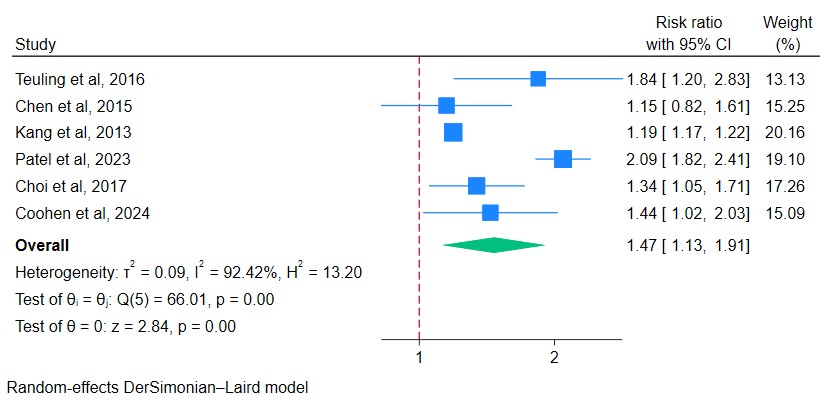Session Information
Date: Monday, October 27, 2025
Title: (1306–1346) Rheumatoid Arthritis – Diagnosis, Manifestations, and Outcomes Poster II
Session Type: Poster Session B
Session Time: 10:30AM-12:30PM
Background/Purpose: Vitiligo is associated with many autoimmune diseases, but its association with rheumatic disease has not been well-defined. Therefore, we conducted a systematic review and meta-analysis to study the association of vitiligo and occurrence of rheumatoid arthritis.
Methods: A comprehensive literature review was conducted by searching for publishedarticles indexed in Pubmed, Embase, Google Scholar, and MEDLINE databases from inception throughJanuary 2025. Identify all observational studies that compared the incidence or risk of developing rheumatoid arthritis (RA) in vitiligo patients compared to non-vitiligo. Pooled risk ratio (RR) and 95% confidence interval (CI) were calculated using a random-effect model, DerSimonian and Laird. Publication bias was analyzed with the Egger test.
Results: A total of 262 articles were identified. Following PRISMA for study selection, 6 studies fulfilled the inclusion criteria and were included in the meta-analysis. The risk of developing rheumatoid arthritis among vitiligo patients was significantly higher than in non-vitiligo patients with the pooled RR of 1.47, 95% CI 1.13-1.91: I2 92.42%. Publication bias analyzed by the Egger test showed no small-study effects with p value of 0.83.
Conclusion: This analysis found that vitiligo is associated with a higher risk of developing rheumatoid arthritis. Further investigation is required to determine the causal relationship.
 Forest plot of the meta-analysis of rheumatoid arthritis in patients with vitiligo
Forest plot of the meta-analysis of rheumatoid arthritis in patients with vitiligo
To cite this abstract in AMA style:
Chaisrimaneepan N, Khoruamklang t, Yingchoncharoen P, Sodsri T, Paz M. The Association of Rheumatoid Arthritis in Patients with Vitiligo: Systematic Review and Meta-Analysis [abstract]. Arthritis Rheumatol. 2025; 77 (suppl 9). https://acrabstracts.org/abstract/the-association-of-rheumatoid-arthritis-in-patients-with-vitiligo-systematic-review-and-meta-analysis/. Accessed .« Back to ACR Convergence 2025
ACR Meeting Abstracts - https://acrabstracts.org/abstract/the-association-of-rheumatoid-arthritis-in-patients-with-vitiligo-systematic-review-and-meta-analysis/
